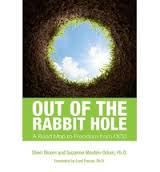This is a book co-written by Sheri Bloom, a survivor of Obsessive-Compulsive Disorder (OCD) and by a clinical psychologist who specializes in behavioral therapy for anxiety disorders (Mouton-Odum). The book clearly explains what OCD is, how it damages a person’s life and well-being, and how it can be fought through cognitive-behavioral therapy. The disease involves severe episodes of anxiety, which are dealt with by repetitive behaviors such as checking and rechecking doors, washing hands, or making sure objects are arranged in a particular order. However, the relief is extremely temporary, the anxiety only increases with the repetitive behaviors, and the behaviors themselves begin to interfere with the patient’s life and well-being. The strategy recommended by the authors is to sit with the anxiety, allow it to happen, and refuse to follow the behaviors, in order to weaken the disease, and they offer several mental techniques to help the patient do so.
The authors personify the disease, making it into an enemy to be fought and giving the patient something tangible on which to focus their anger. Ms. Bloom’s relation of her personal fight with OCD helps illustrate both how damaging the disease can be, and gives a real example of someone who survived and fought back. Dr. Mouton-Odum provides the professional perspective and the clinical background needed to understand the disease, as well as evidence of cognitive-behavioral therapy’s effectiveness for other clients. The book is written in clear, direct, sympathetic language, accessible to the layperson, with little if any jargon.
There are occasional typos that mar the book, but they are not frequent. Also, Ms. Bloom’s experience, at least partly stemming from abuse in her childhood, may not be entirely typical, though the authors acknowledge this clearly at several points, and it does not mean that her experience is not useful.
OUT OF THE RABBIT HOLE may be a valuable resource both for those actually dealing with full-blown OCD and those who are beginning to show symptoms and wish to nip it in the bud before it becomes severe.
Reviewed by Catherine Langrehr for IndieReader
